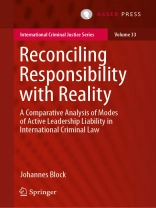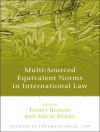This book explores the issue of leadership criminality from a new angle by comparing two highly relevant modes of responsibility. By contrasting individual criminal responsibility for ordering international crimes with indirect perpetration through an organisation, it shows the doctrinal weaknesses of the latter and outlines the much-overlooked advantages of the former. The volume analyses the development of both forms of responsibility, looking at their origins, and their reception in academia and practical use in jurisprudence.
The history of indirect perpetration through an organisation (Organisationsherrschaft) is portrayed from its German academic origin, through German jurisprudence to the reception of the doctrine at the International Criminal Court. By comparing the doctrine’s stages of evolution, the book sheds light on the different aspects of the various models of indirect perpetration through an organisation and carves out general and fundamental criticismof it. The characteristics of ordering liability are explored in depth through an analysis of jurisprudence of the Nuremberg subsequent trials, the ad hoc tribunals and the International Criminal Court. This historic and doctrinal comparison reveals a well-defined and to-date much neglected mode of responsibility with enormous potential for the adjudication of leadership figures in the ambit of international criminal law and only one conclusion can follow from this analysis: it calls for practitioners and academics to leave the well-trodden paths of national criminal law doctrine and embrace truly international modes of liability such as the ordering of a crime.
This volume in the ICJ series provides practitioners, researchers and students with a detailed account of forms of leadership liability and an innovative approach to the topic’s most discussed issue.
Dr. Johannes Block is a criminal lawyer specializing in international criminal law, responsibility of leadership figures, questions of perpetration and participation in crime as well as the national-socialists’ crimes. He studied in Münster, Germany and Bogotá, Colombia and obtained his Dr. iur. from the University of Cologne, where he also worked and taught as a research assistant for several years. His legal clerkship led him to organized crime investigations, criminal defence, the European Commission and the German Federal Ministry of Justice.
Cuprins
Chapter 1. Introduction.- Part I. Indirect Perpetration through an Organisation.- Chapter 2. The German Origins of Indirect Perpetration through an Organised Apparatus of Power.- Chapter 3 Indirect Perpetration through an Organisation under the Rome Statute.- Part II. Responsibility for Ordering a Crime.- Chapter 4. Historic Precedents: Ordering in Post-World War II Trials.- Chapter 5. Responsibility for Ordering a Crime under the Jurisprudence of the Ad Hoc Tribunals for the Former Yugoslavia and Rwanda.- Chapter 6. Responsibility for Ordering under Art. 25 (3) (b) of the Rome Statute.- Part III. Comparison, Evaluation and Conclusion.- Chapter 7. Comparison and Evaluation.- Chapter 8. Conclusion: The Responsibility of Decision Makers for Ordering the Commission of International Crimes.- Bibliography.- Table of Cases.- Index.












